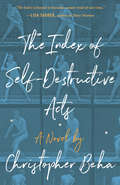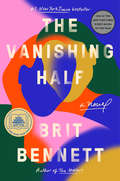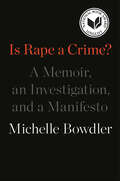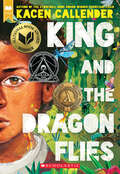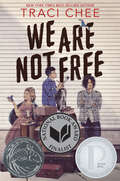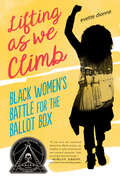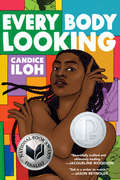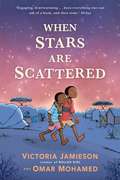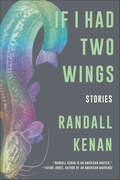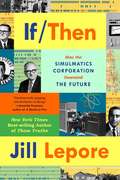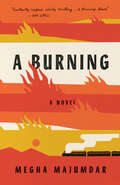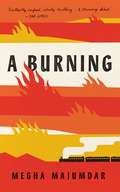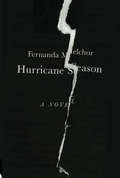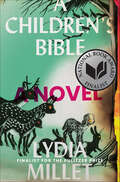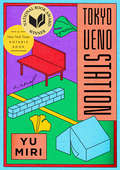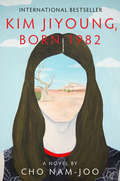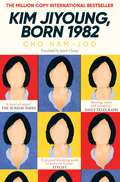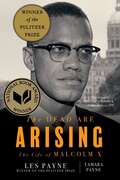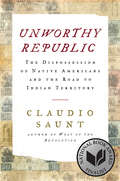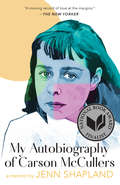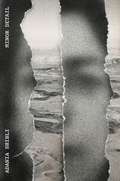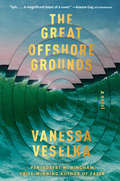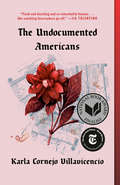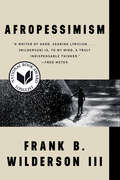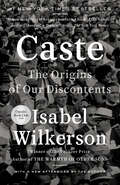Special Collections
National Book Awards Long List 2020
- Table View
- List View
The Index of Self-Destructive Acts
by Christopher Beha“A significant novel, beautifully crafted and deeply felt. Beha creates a high bonfire of our era's vanities. . . .This is a novel to savor.”- Colum McCann Through baseball, finance, media, and religion, Beha traces the passing of the torch from the old establishment to the new meritocracy, exploring how each generation’s failure helped land us where we are today. What makes a life, Sam Waxworth sometimes wondered—self or circumstance? On the day Sam Waxworth arrives in New York to write for the Interviewer, a street-corner preacher declares that the world is coming to an end. A data journalist and recent media celebrity—he correctly forecast every outcome of the 2008 election—Sam knows a few things about predicting the future. But when projection meets reality, life gets complicated. His first assignment for the Interviewer is a profile of disgraced political columnist Frank Doyle, known to Sam for the sentimental works of baseball lore that first sparked his love of the game. When Sam meets Frank at Citi Field for the Mets’ home opener, he finds himself unexpectedly ushered into Doyle’s crumbling family empire. Kit, the matriarch, lost her investment bank to the financial crisis; Eddie, their son, hasn’t been the same since his second combat tour in Iraq; Eddie’s best friend from childhood, the fantastically successful hedge funder Justin Price, is starting to see cracks in his spotless public image. And then there’s Frank’s daughter, Margo, with whom Sam becomes involved—just as his wife, Lucy, arrives from Wisconsin. While their lives seem inextricable, none of them know how close they are to losing everything, including each other. Sweeping in scope yet meticulous in its construction, The Index of Self-Destructive Acts is a remarkable family portrait and a masterful evocation of New York City and its institutions. Over the course of a single baseball season, Christopher Beha traces the passing of the torch from the old establishment to the new meritocracy, exploring how each generation’s failure helped land us where we are today. Whether or not the world is ending, Beha’s characters are all headed to apocalypses of their own making.
The Vanishing Half
by Brit BennettFrom The New York Times-bestselling author of The Mothers, a stunning new novel about twin sisters, inseparable as children, who ultimately choose to live in two very different worlds, one black and one white.
The Vignes twin sisters will always be identical. But after growing up together in a small, southern black community and running away at age sixteen, it's not just the shape of their daily lives that is different as adults, it's everything: their families, their communities, their racial identities. Many years later, one sister lives with her black daughter in the same southern town she once tried to escape. The other secretly passes for white, and her white husband knows nothing of her past. Still, even separated by so many miles and just as many lies, the fates of the twins remain intertwined. What will happen to the next generation, when their own daughters' storylines intersect?
Weaving together multiple strands and generations of this family, from the Deep South to California, from the 1950s to the 1990s, Brit Bennett produces a story that is at once a riveting, emotional family story and a brilliant exploration of the American history of passing. Looking well beyond issues of race, The Vanishing Half considers the lasting influence of the past as it shapes a person's decisions, desires, and expectations, and explores some of the multiple reasons and realms in which people sometimes feel pulled to live as something other than their origins. As with her New York Times-bestselling debut The Mothers, Brit Bennett offers an engrossing page-turner about family and relationships that is immersive and provocative, compassionate and wise.
A New York Times Bestseller
Is Rape a Crime?
by Michelle BowdlerLonglisted for the 2020 National Book Award for NonfictionTIME's 100 Must-Read Books of 2020Publishers Weekly, Best Books of 2020New York Times New & Noteworthy AudiobooksLit Hubs Most Anticipated Books of 2020Starred Review Publishers WeeklyStarred Review Shelf Awareness"Is Rape a Crime? is beautifully written and compellingly told. In 2020, we were all looking for solutions and this book was right on time. It is one we should all be reading." —Anita Hill"This standout memoir marks a crucial moment in the discussion of what constitutes a violent crime."—Publishers Weekly, Best Books of 2020 She Said meets Know My Name in Michelle Bowdler's provocative debut, telling the story of her rape and recovery while interrogating why one of society's most serious crimes goes largely uninvestigated.The crime of rape sizzles like a lightning strike. It pounces, flattens, destroys. A person stands whole, and in a moment of unexpected violence, that life, that body is gone.Award-winning writer and public health executive Michelle Bowdler's memoir indicts how sexual violence has been addressed for decades in our society, asking whether rape is a crime given that it is the least reported major felony, least successfully prosecuted, and fewer than 3% of reported rapes result in conviction. Cases are closed before they are investigated and DNA evidence sits for years untested and disregardedRape in this country is not treated as a crime of brutal violence but as a parlor game of he said / she said. It might be laughable if it didn’t work so much of the time. Given all this, it seems fair to ask whether rape is actually a crime.In 1984, the Boston Sexual Assault Unit was formed as a result of a series of break-ins and rapes that terrorized the city, of which Michelle’s own horrific rape was the last. Twenty years later, after a career of working with victims like herself, Michelle decides to find out what happened to her case and why she never heard from the police again after one brief interview. Is Rape a Crime? is an expert blend of memoir and cultural investigation, and Michelle's story is a rallying cry to reclaim our power and right our world.
King and the Dragonflies
by Kacen CallenderTwelve-year-old Kingston James is sure his brother Khalid has turned into a dragonfly. When Khalid unexpectedly passed away, he shed what was his first skin for another to live down by the bayou in their small Louisiana town. Khalid still visits in dreams, and King must keep these secrets to himself as he watches grief transform his family.
It would be easier if King could talk with his best friend, Sandy Sanders. But just days before he died, Khalid told King to end their friendship, after overhearing a secret about Sandy-that he thinks he might be gay. "You don't want anyone to think you're gay too, do you?"
But when Sandy goes missing, sparking a town-wide search, and King finds his former best friend hiding in a tent in his backyard, he agrees to help Sandy escape from his abusive father, and the two begin an adventure as they build their own private paradise down by the bayou and among the dragonflies. As King's friendship with Sandy is reignited, he's forced to confront questions about himself and the reality of his brother's death.
The Thing About Jellyfish meets The Stars Beneath Our Feet in this story about loss, grief, and finding the courage to discover one's identity, from the author of Hurricane Child.
We Are Not Free
by Traci Chee“All around me, my friends are talking, joking, laughing. Outside is the camp, the barbed wire, the guard towers, the city, the country that hates us. We are not free. But we are not alone.”
From New York Times best-selling and acclaimed author Traci Chee comes We Are Not Free, the collective account of a tight-knit group of young Nisei, second-generation Japanese American citizens, whose lives are irrevocably changed by the mass U.S. incarcerations of World War II.
Fourteen teens who have grown up together in Japantown, San Francisco. Fourteen teens who form a community and a family, as interconnected as they are conflicted. Fourteen teens whose lives are turned upside down when over 100,000 people of Japanese ancestry are removed from their homes and forced into desolate incarceration camps.
In a world that seems determined to hate them, these young Nisei must rally together as racism and injustice threaten to pull them apart.
Lifting as We Climb
by Evette DionneFor African American women, the fight for the right to vote was only one battle.
An eye-opening book that tells the important, overlooked story of black women as a force in the suffrage movement--when fellow suffragists did not accept them as equal partners in the struggle.
Susan B. Anthony. Elizabeth Cady Stanton. Alice Paul. The Women's Rights Convention at Seneca Falls. The 1913 Women's March in D.C. When the epic story of the suffrage movement in the United States is told, the most familiar leaders, speakers at meetings, and participants in marches written about or pictured are generally white.
The real story isn't monochromatic.
Women of color, especially African American women, were fighting for their right to vote and to be treated as full, equal citizens of the United States. Their battlefront wasn't just about gender. African American women had to deal with white abolitionist-suffragists who drew the line at sharing power with their black sisters. They had to overcome deep, exclusionary racial prejudices that were rife in the American suffrage movement. And they had to maintain their dignity--and safety--in a society that tried to keep them in its bottom ranks.
Lifting as We Climb is the empowering story of African American women who refused to accept all this. Women in black church groups, black female sororities, black women's improvement societies and social clubs. Women who formed their own black suffrage associations when white-dominated national suffrage groups rejected them. Women like Mary Church Terrell, a founder of the National Association of Colored Women and of the NAACP; or educator-activist Anna Jullia Cooper who championed women getting the vote and a college education; or the crusading journalist Ida B. Wells, a leader in both the suffrage and anti-lynching movements.
Author Evette Dionne, a feminist culture writer and the editor-in-chief of Bitch Media, has uncovered an extraordinary and underrepresented history of black women. In her powerful book, she draws an important historical line from abolition to suffrage to civil rights to contemporary young activists--filling in the blanks of the American suffrage story.
Every Body Looking
by Candice IlohLonglisted for the National Book Award.
When Ada leaves home for her freshman year at a Historically Black College, it’s the first time she’s ever been so far from her family—and the first time that she’s been able to make her own choices and to seek her place in this new world. As she stumbles deeper into the world of dance and explores her sexuality, she also begins to wrestle with her past—her mother’s struggle with addiction, her Nigerian father’s attempts to make a home for her. Ultimately, Ada discovers she needs to brush off the destiny others have chosen for her and claim full ownership of her body and her future.
When Stars are Scattered
by Victoria Jamieson and Omar MohamedOmar and his brother Hassan, two Somali boys, have spent a long time in the Dadaab refugee camp. Separated from their mother, they are looked after by a friendly stranger. Life in the camp isn't always easy. The hunger is constant . . . but there's football to look forward to, and now there's a chance Omar will get to go to school . . .With a heart-wrenching fairytale ending, this incredible true story is brought to life by Victoria's stunning illustrations. This book perfectly depicts life in a refugee camp for 8-12 year olds.
If I Had Two Wings
by Randall KenanFinalist for 2020 National Book Critics Circle Award in Fiction Longlisted for the 2020 National Book Award for Fiction Finalist for the 2021 Aspen Words Literary Prize Mingling the earthy with the otherworldly, these ten stories chronicle ineffable events in ordinary lives.In Kenan’s fictional territory of Tims Creek, North Carolina, an old man rages in his nursing home, a parson beats up an adulterer, a rich man is haunted by a hog, and an elderly woman turns unwitting miracle worker. A retired plumber travels to Manhattan, where Billy Idol sweeps him into his entourage. An architect who lost his famous lover to AIDS reconnects with a high-school fling. Howard Hughes seeks out the woman who once cooked him butter beans.Shot through with humor and seasoned by inventiveness and maturity, Kenan riffs on appetites of all kinds, on the eerie persistence of history, and on unstoppable lovers and unexpected salvations. If I Had Two Wings is a rich chorus of voices and visions, dreams and prophecies, marked by physicality and spirit. Kenan’s prose is nothing short of wondrous.
If Then
by Jill LeporeLonglisted • Financial Times & McKinsey Business Book of the Year A revelatory account of the Cold War origins of the data-mad, algorithmic twenty-first century, from the author of the acclaimed international bestseller These Truths. The Simulmatics Corporation, launched during the Cold War, mined data, targeted voters, manipulated consumers, destabilized politics, and disordered knowledge—decades before Facebook, Google, and Cambridge Analytica. Jill Lepore, best-selling author of These Truths, came across the company’s papers in MIT’s archives and set out to tell this forgotten history, the long-lost backstory to the methods, and the arrogance, of Silicon Valley. Founded in 1959 by some of the nation’s leading social scientists—“the best and the brightest, fatally brilliant, Icaruses with wings of feathers and wax, flying to the sun”—Simulmatics proposed to predict and manipulate the future by way of the computer simulation of human behavior. In summers, with their wives and children in tow, the company’s scientists met on the beach in Long Island under a geodesic, honeycombed dome, where they built a “People Machine” that aimed to model everything from buying a dishwasher to counterinsurgency to casting a vote. Deploying their “People Machine” from New York, Washington, Cambridge, and even Saigon, Simulmatics’ clients included the John F. Kennedy presidential campaign, the New York Times, the Department of Defense, and dozens of major manufacturers: Simulmatics had a hand in everything from political races to the Vietnam War to the Johnson administration’s ill-fated attempt to predict race riots. The company’s collapse was almost as rapid as its ascent, a collapse that involved failed marriages, a suspicious death, and bankruptcy. Exposed for false claims, and even accused of war crimes, it closed its doors in 1970 and all but vanished. Until Lepore came across the records of its remains. The scientists of Simulmatics believed they had invented “the A-bomb of the social sciences.” They did not predict that it would take decades to detonate, like a long-buried grenade. But, in the early years of the twenty-first century, that bomb did detonate, creating a world in which corporations collect data and model behavior and target messages about the most ordinary of decisions, leaving people all over the world, long before the global pandemic, crushed by feelings of helplessness. This history has a past; If Then is its cautionary tale.
A Burning
by Megha MajumdarFor readers of Tommy Orange, Yaa Gyasi, and Jhumpa Lahiri, an electrifying debut novel about three unforgettable characters who seek to rise--to the middle class, to politcal power, to fame in the movies--and find their lives entangled in the wake of a catastrophe in contemporary India.Jivan is a Muslim girl from the slums, determined to move up in life, who is accused of executing a terrorist attack on a train because of a careless comment on Facebook. PT Sir is an opportunistic gym teacher who hitches his aspirations to a right-wing political party, and finds that his own ascent becomes linked to Jivan's fall. Lovely--an irresistible outcast whose exuberant voice and dreams of glory fill the novel with warmth and hope and humour--has the alibi that can set Jivan free, but it will cost her everything she holds dear. Taut, symphonic, propulsive, and riveting from its opening lines, A Burning has the force of an epic while being so masterfully compressed it can be read in a single sitting. Majumdar writes with dazzling assurance at a breakneck pace on complex themes that read here as the components of a thriller: class, fate, corruption, justice, and what it feels like to face profound obstacles and yet nurture big dreams in a country spinning toward extremism. An extraordinary debut. A novel about fate, power, opportunity, and class; about innocence and guilt, betrayal and love, and the corrosive media cycle that manufactures falsehoods masquerading as truths--A Burning is a debut novel of exceptional power and urgency, haunting and beautiful, brutal, vibrant, impossible to forget.
A Burning
by Megha MajumdarA girl walks through the slums of Kolkata holding an armful of books. She returns home smelling of smoke, and checks her most prized possession: a brand-new smartphone, purchased in instalments. On Facebook, there is only one conversation. #KolabaganTrainAttack On the small, glowing screen, she types a dangerous thing… &‘If the police didn&’t help ordinary people like you and me, if the police watched them die, doesn&’t that mean that the government is also a terrorist?&’ Set in contemporary India, A Burning is the story of three unforgettable characters, all dreaming of a better future, whose lives are changed for ever when they become caught up in the devastating aftermath of a terrorist attack. Jivan – a poor, young, Muslim girl, who dreams of going to college – faces a possible death sentence after being accused of collaborating with the terrorists. Lovely – an exuberant hijra who longs to be a Bollywood star – holds the alibi that can set Jivan free, but telling the truth will cost her everything she holds dear. PT Sir – an opportunistic gym teacher who once taught Jivan – becomes involved with Hindu nationalist politics and his own ascent is soon inextricably linked to Jivan&’s fall. Taut, propulsive and electrifying, from its opening lines to its astonishing finale, A Burning confronts issues of class, fate, prejudice and corruption with a Dickensian sense of injustice, and asks us to consider what it means to nurture big ambitions in a country hurtling towards political extremism.ABurning is a novel for our times and for all time.
Hurricane Season
by Fernanda MelchorThe English-language debut of one of the most thrilling and accomplished young Mexican writers The Witch is dead. And the discovery of her corpse—by a group of children playing near the irrigation canals—propels the whole village into an investigation of how and why this murder occurred. Rumors and suspicions spread. As the novel unfolds in a dazzling linguistic torrent, with each unreliable narrator lingering on new details, new acts of depravity or brutality, Melchor extracts some tiny shred of humanity from these characters that most would write off as utterly irredeemable, forming a lasting portrait of a damned Mexican village. Like Roberto Bolano’s 2666 or Faulkner’s greatest novels, Hurricane Season takes place in a world filled with mythology and violence—real violence, the kind that seeps into the soil, poisoning everything around: it’s a world that becomes more terrifying and more terrifyingly real the deeper you explore it.
A Children's Bible
by Lydia MilletFinalist for the 2020 National Book Award for Fiction One of the New York Times' Ten Best Books of the Year Named one of the best novels of the year by Time, Washington Post, NPR, Chicago Tribune, Esquire, BBC, and many others National Bestseller "A blistering little classic." —Ron Charles, Washington PostA Children’s Bible follows a group of twelve eerily mature children on a forced vacation with their families at a sprawling lakeside mansion. Contemptuous of their parents, the children decide to run away when a destructive storm descends on the summer estate, embarking on a dangerous foray into the apocalyptic chaos outside. Lydia Millet’s prophetic and heartbreaking story of generational divide offers a haunting vision of what awaits us on the far side of Revelation.
Tokyo Ueno Station
by Yu MiriA surreal, devastating story of a homeless ghost who haunts one of Tokyo's busiest train stations.Kazu is dead. Born in Fukushima in 1933, the same year as the Japanese Emperor, his life is tied by a series of coincidences to the Imperial family and has been shaped at every turn by modern Japanese history. But his life story is also marked by bad luck, and now, in death, he is unable to rest, doomed to haunt the park near Ueno Station in Tokyo. Kazu's life in the city began and ended in that park; he arrived there to work as a laborer in the preparations for the 1964 Tokyo Olympics and ended his days living in the vast homeless village in the park, traumatized by the destruction of the 2011 tsunami and shattered by the announcement of the 2020 Olympics.Through Kazu's eyes, we see daily life in Tokyo buzz around him and learn the intimate details of his personal story, how loss and society's inequalities and constrictions spiraled towards this ghostly fate, with moments of beauty and grace just out of reach. A powerful masterwork from one of Japan's most brilliant outsider writers, Tokyo Ueno Station is a book for our times and a look into a marginalized existence in a shiny global megapolis.
Kim Jiyoung, Born 1982
by Cho Nam-JooA fierce international bestseller that launched Korea’s new feminist movement, Kim Jiyoung, Born 1982 follows one woman’s psychic deterioration in the face of rigid misogyny.
Truly, flawlessly, completely, she became that person.
In a small, tidy apartment on the outskirts of the frenzied metropolis of Seoul lives Kim Jiyoung. A thirtysomething-year-old “millennial everywoman,” she has recently left her white-collar desk job—in order to care for her newborn daughter full-time—as so many Korean women are expected to do. But she quickly begins to exhibit strange symptoms that alarm her husband, parents, and in-laws: Jiyoung impersonates the voices of other women—alive and even dead, both known and unknown to her. As she plunges deeper into this psychosis, her discomfited husband sends her to a male psychiatrist.
In a chilling, eerily truncated third-person voice, Jiyoung’s entire life is recounted to the psychiatrist—a narrative infused with disparate elements of frustration, perseverance, and submission. Born in 1982 and given the most common name for Korean baby girls, Jiyoung quickly becomes the unfavored sister to her princeling little brother. Always, her behavior is policed by the male figures around her—from the elementary school teachers who enforce strict uniforms for girls, to the coworkers who install a hidden camera in the women’s restroom and post their photos online. In her father’s eyes, it is Jiyoung’s fault that men harass her late at night; in her husband’s eyes, it is Jiyoung’s duty to forsake her career to take care of him and their child—to put them first.
Jiyoung’s painfully common life is juxtaposed against a backdrop of an advancing Korea, as it abandons “family planning” birth control policies and passes new legislation against gender discrimination. But can her doctor flawlessly, completely cure her, or even discover what truly ails her?
Rendered in minimalist yet lacerating prose, Kim Jiyoung, Born 1982 sits at the center of our global #MeToo movement and announces the arrival of writer of international significance.
Kim Jiyoung, Born 1982
by Cho Nam-JooIn a small, tidy apartment on the outskirts of the frenzied metropolis of Seoul lives Kim Jiyoung. A thirtysomething-year-old “millennial everywoman,” she has recently left her white-collar desk job—in order to care for her newborn daughter full-time—as so many Korean women are expected to do. But she quickly begins to exhibit strange symptoms that alarm her husband, parents, and in-laws: Jiyoung impersonates the voices of other women—alive and even dead, both known and unknown to her. As she plunges deeper into this psychosis, her discomfited husband sends her to a male psychiatrist.
In a chilling, eerily truncated third-person voice, Jiyoung’s entire life is recounted to the psychiatrist—a narrative infused with disparate elements of frustration, perseverance, and submission. Born in 1982 and given the most common name for Korean baby girls, Jiyoung quickly becomes the unfavored sister to her princeling little brother. Always, her behavior is policed by the male figures around her—from the elementary school teachers who enforce strict uniforms for girls, to the coworkers who install a hidden camera in the women’s restroom and post their photos online. In her father’s eyes, it is Jiyoung’s fault that men harass her late at night; in her husband’s eyes, it is Jiyoung’s duty to forsake her career to take care of him and their child—to put them first.
The Dead Are Arising
by Les Payne and Tamara PayneAn epic, award-winning biography of Malcolm X that draws on hundreds of hours of personal interviews and rewrites much of the known narrative. Les Payne, the renowned Pulitzer Prize–winning investigative journalist, embarked in 1990 on a nearly thirty-year-long quest to create an unprecedented portrait of Malcolm X, one that would separate fact from fiction. The result is this historic, National Book Award–winning biography, which interweaves previously unknown details of Malcolm X’s life—from harrowing Depression-era vignettes to a moment-by-moment retelling of the 1965 assassination—into an extraordinary account that contextualizes Malcolm X’s life against the wider currents of American history. Bookended by essays from Tamara Payne, Payne’s daughter and primary researcher, who heroically completed the biography after her father’s death in 2018, The Dead Are Arising affirms the centrality of Malcolm X to the African American freedom struggle.
Unworthy Republic
by Claudio SauntWinner of the 2021 Bancroft Prize and the 2021 Ridenhour Book Prize Finalist for the 2020 National Book Award for Nonfiction Named a Top Ten Best Book of 2020 by the Washington Post and Publishers Weekly and a New York Times Critics' Top Book of 2020 A masterful and unsettling history of “Indian Removal,” the forced migration of Native Americans across the Mississippi River in the 1830s and the state-sponsored theft of their lands. In May 1830, the United States launched an unprecedented campaign to expel 80,000 Native Americans from their eastern homelands to territories west of the Mississippi River. In a firestorm of fraud and violence, thousands of Native Americans lost their lives, and thousands more lost their farms and possessions. The operation soon devolved into an unofficial policy of extermination, enabled by US officials, southern planters, and northern speculators. Hailed for its searing insight, Unworthy Republic transforms our understanding of this pivotal period in American history.
My Autobiography of Carson McCullers
by Jenn Shapland“Gorgeous, symphonic, tender, and brilliant, My Autobiography of Carson McCullers is a monumental achievement." -Carmen Maria Machado While working as an intern in the archives at the Harry Ransom Center, Jenn Shapland encounters the love letters of Carson and a woman named Annemarie—letters are that are tender, intimate, and unabashed in their feelings. Shapland recognizes herself in the letters’ language—but does not see Carson as history has portrayed her. And so, Shapland is compelled to undertake a recovery of the full narrative and language of Carson's life: She wades through the therapy transcripts; she stays at Carson’s childhood home, where she lounges in her bathtub and eats delivery pizza; she relives Carson’s days at her beloved Yaddo. As Shapland reckons with the expanding and collapsing distance between her and Carson, she sees the way Carson’s story has become a way to articulate something about herself. The results articulate something entirely new not only about this one remarkable, walleyed life, but about the way we tell queer love stories. In genre-defying vignettes, Jenn Shapland interweaves her own story with Carson McCullers’s to create a vital new portrait of one of America’s most beloved writers, and shows us how the writers we love and the stories we tell about ourselves make us who we are.
Minor Detail
by Adania ShibliA searing, beautiful novel meditating on war, violence, memory, and the sufferings of the Palestinian people Minor Detail begins during the summer of 1949, one year after the war that the Palestinians mourn as the Nakba—the catastrophe that led to the displacement and exile of some 700,000 people—and the Israelis celebrate as the War of Independence. Israeli soldiers murder an encampment of Bedouin in the Negev desert, and among their victims they capture a Palestinian teenager and they rape her, kill her, and bury her in the sand. Many years later, in the near-present day, a young woman in Ramallah tries to uncover some of the details surrounding this particular rape and murder, and becomes fascinated to the point of obsession, not only because of the nature of the crime, but because it was committed exactly twenty-five years to the day before she was born. Adania Shibli masterfully overlays these two translucent narratives of exactly the same length to evoke a present forever haunted by the past.
The Great Offshore Grounds
by Vanessa VeselkaA wildly original, cross-country novel that subverts a long tradition of family narratives and casts new light on the mythologies--national, individual, and collective--that drive and define us.On the day of their estranged father's wedding, half sisters Cheyenne and Livy set off to claim their inheritance. It's been years since the two have seen each other. Cheyenne is newly back in Seattle, crashing with Livy after a failed marriage and a series of dead ends. Livy works refinishing boats, her resentment against her freeloading sister growing as she tamps down dreams of fishing off the coast of Alaska. But the promise of a shot at financial security brings the two together to claim what's theirs. Except, instead of money, what their father gives them is information--a name--which both reveals a stunning family secret and compels them to come to grips with it. In the face of their new reality, the sisters and their adopted brother each set out on journeys that will test their faith in one another, as well as their definitions of freedom.Moving from Seattle's underground to the docks of the Far North, from the hideaways of the southern swamps to the storied reaches of the Great Offshore Grounds, Vanessa Veselka spins a tale with boundless verve, linguistic vitality, and undeniable tenderness.
The Undocumented Americans
by Karla Cornejo VillavicencioOne of the first undocumented immigrants to graduate from Harvard reveals the hidden lives of her fellow undocumented Americans in this deeply personal and groundbreaking portrait of a nation.
Writer Karla Cornejo Villavicencio was on DACA when she decided to write about being undocumented for the first time using her own name. It was right after the election of 2016, the day she realized the story she’d tried to steer clear of was the only one she wanted to tell. So she wrote her immigration lawyer’s phone number on her hand in Sharpie and embarked on a trip across the country to tell the stories of her fellow undocumented immigrants—and to find the hidden key to her own.
Looking beyond the flashpoints of the border or the activism of the DREAMers, Cornejo Villavicencio explores the lives of the undocumented—and the mysteries of her own life. She finds the singular, effervescent characters across the nation often reduced in the media to political pawns or nameless laborers. The stories she tells are not deferential or naively inspirational but show the love, magic, heartbreak, insanity, and vulgarity that infuse the day-to-day lives of her subjects.
In New York, we meet the undocumented workers who were recruited into the federally funded Ground Zero cleanup after 9/11. In Miami, we enter the ubiquitous botanicas, which offer medicinal herbs and potions to those whose status blocks them from any other healthcare options. In Flint, Michigan, we learn of demands for state ID in order to receive life-saving clean water. In Connecticut, Cornejo Villavicencio, childless by choice, finds family in two teenage girls whose father is in sanctuary.
And through it all we see the author grappling with the biggest questions of love, duty, family, and survival. In her incandescent, relentlessly probing voice, Karla Cornejo Villavicencio combines sensitive reporting and powerful personal narratives to bring to light remarkable stories of resilience, madness, and death. Through these stories we come to understand what it truly means to be a stray. An expendable. A hero. An American.
Afropessimism
by Frank B. Wilderson III“Wilderson’s thinking teaches us to believe in the miraculous even as we decry the brutalities out of which miracles emerge”—Fred Moten Praised as “a trenchant, funny, and unsparing work of memoir and philosophy” (Aaron Robertson,?Literary Hub), Frank B. Wilderson’s Afropessimism arrived at a moment when protests against police brutality once again swept the nation. Presenting an argument we can no longer ignore, Wilderson insists that we must view Blackness through the lens of perpetual slavery. Radical in conception, remarkably poignant, and with soaring flights of memoir, Afropessimism reverberates with wisdom and painful clarity in the fractured world we inhabit.“Wilderson’s ambitious book offers its readers two great gifts. First, it strives mightily to make its pessimistic vision plausible. . . . Second, the book depicts a remarkable life, lived with daring and sincerity.”—Paul C. Taylor, Washington Post
Caste
by Isabel WilkersonIn this brilliant book, Isabel Wilkerson gives us a masterful portrait of an unseen phenomenon in America as she explores, through an immersive, deeply researched narrative and stories about real people, how America today and throughout its history has been shaped by a hidden caste system, a rigid hierarchy of human rankings.
Beyond race, class, or other factors, there is a powerful caste system that influences people’s lives and behavior and the nation’s fate. Linking the caste systems of America, India, and Nazi Germany, Wilkerson explores eight pillars that underlie caste systems across civilizations, including divine will, bloodlines, stigma, and more. Using riveting stories about people—including Martin Luther King, Jr., baseball’s Satchel Paige, a single father and his toddler son, Wilkerson herself, and many others—she shows the ways that the insidious undertow of caste is experienced every day. She documents how the Nazis studied the racial systems in America to plan their out-cast of the Jews; she discusses why the cruel logic of caste requires that there be a bottom rung for those in the middle to measure themselves against; she writes about the surprising health costs of caste, in depression and life expectancy, and the effects of this hierarchy on our culture and politics. Finally, she points forward to ways America can move beyond the artificial and destructive separations of human divisions, toward hope in our common humanity.
Beautifully written, original, and revealing, Caste: The Origins of Our Discontents is an eye-opening story of people and history, and a reexamination of what lies under the surface of ordinary lives and of American life today.
A New York Times bestseller
